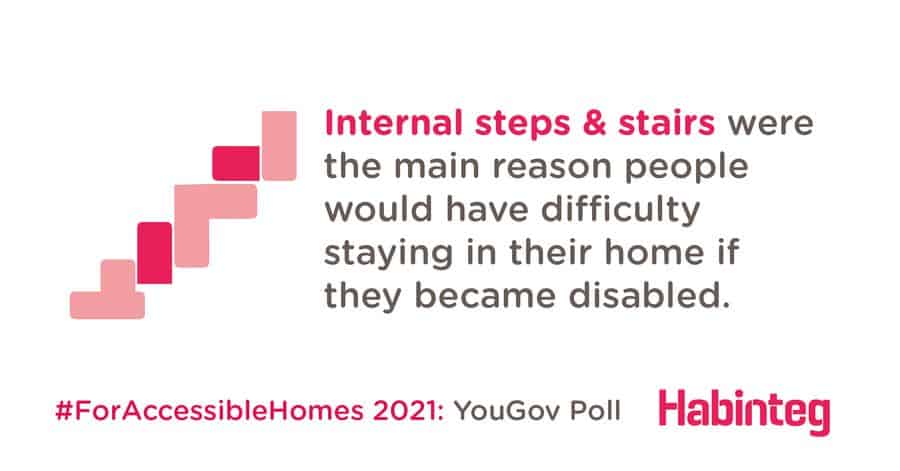Habinteg reveals that half of Brits will need to leave their homes if they become disabled

New research commissioned by Habinteg Housing Association has revealed that over half of British adults say they will have to leave their homes if they become physically disabled.
The YouGov survey, published recently shows that 55 per cent of British adults, who do not have a mobility difficultly, think they would not be able to live in their current home, due to its design and layout, if they become physically disabled.
The survey, which was commissioned as part of Habinteg’s annual #ForAccessibleHomes week, found that of those who said they would have to move, 77 per cent identified internal steps and stairs as the main reason for having to leave their home.
Meanwhile, 48 per cent of British adults felt that their bathroom was not accessible enough, and 44 per cent said that steps up to the front door would be a significant issue if they were to become physically disabled.
The survey also invited people to consider the needs of some of the older people that they know. Just over a third of adults know someone aged 65+ who they think would need to find a suitable home as their mobility needs change. Of that 36 per cent, three in five felt that it would be difficult to find a suitable property.
These findings come just six weeks after the Government published its disability strategy. Among eight commitments on housing, the strategy promises further research and a response to the 2020 consultation on raising accessibility standards for new homes.
Habinteg’s Chief Executive, Nick Apetroaie, said: “It’s no surprise that the majority of people who responded to our survey feared that their home wouldn’t be suitable if they were to become physically disabled.
“Adequate housing is fundamental to inclusion and equality for disabled and older people, but there’s simply not enough supply for the growing demand.
“The Government’s disability strategy promises more research into inclusive and accessible housing. However we need action fast rather than more research to solve the immediate and long term needs of the population.
“What the Government do or don’t do next will effect disabled and older people for many generations to come. We urge them to raise accessibility standards for new homes in their response to the consultation; it’s now make or break for accessible homes.”
Jacquel Runnalls, Accessible and Inclusive Housing Lead, Royal College of Occupational Therapists Specialist Section in Housing, added: “It’s often not until people reach crisis point that they realise their homes are unsuitable to meet their long term needs, and, depending on the circumstances, moving home or adapting isn’t always possible or ideal for the individual.
“It’s therefore vital that we push for accessible and adaptable standards in all new homes if our housing is going to become genuinely inclusive and stand the test of time for current and future generations.”
Habinteg is currently running its sixth annual #ForAccessibleHomes this week – a campaign which aims to highlight the positive impact that accessible homes can bring to individuals, families and the community.


